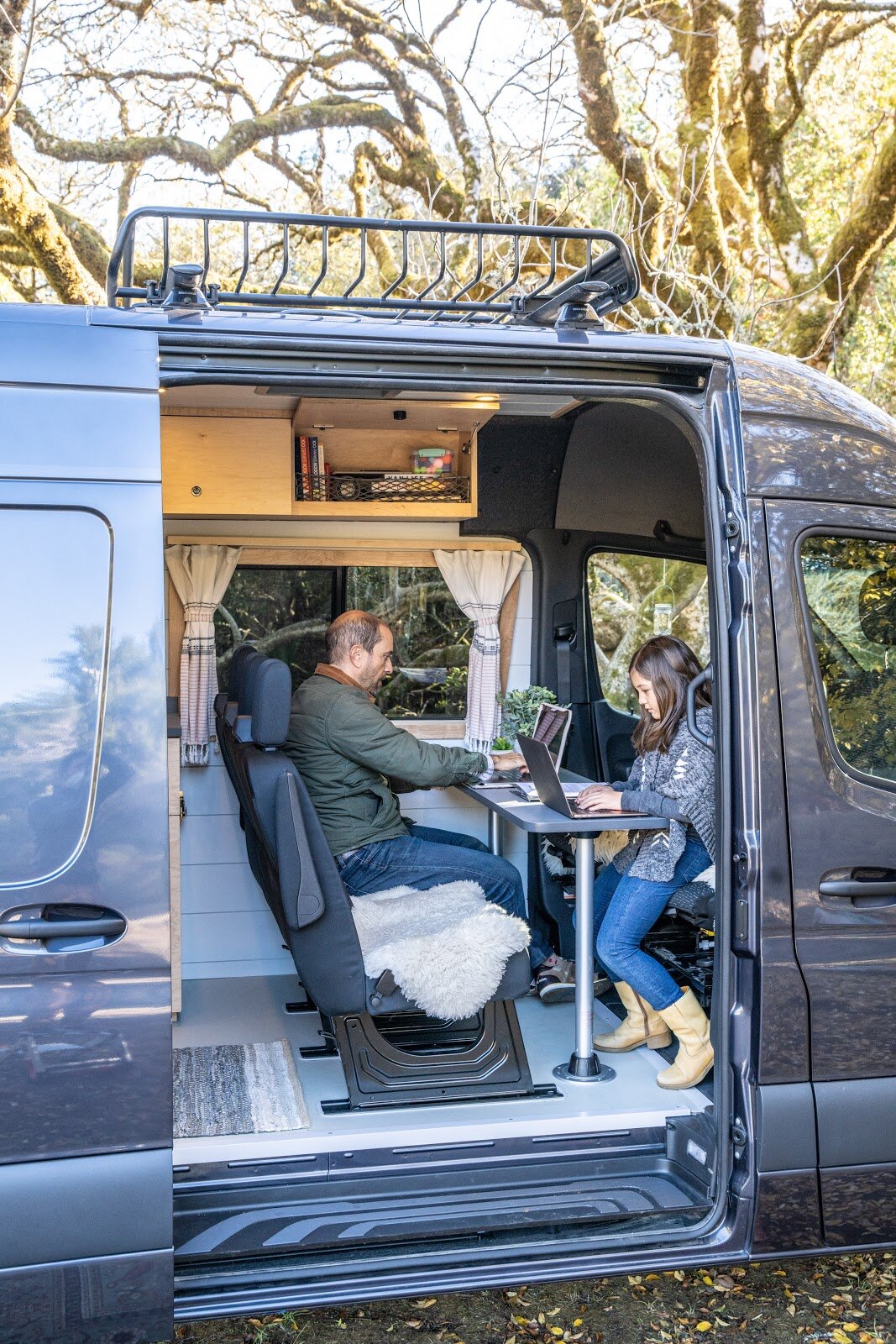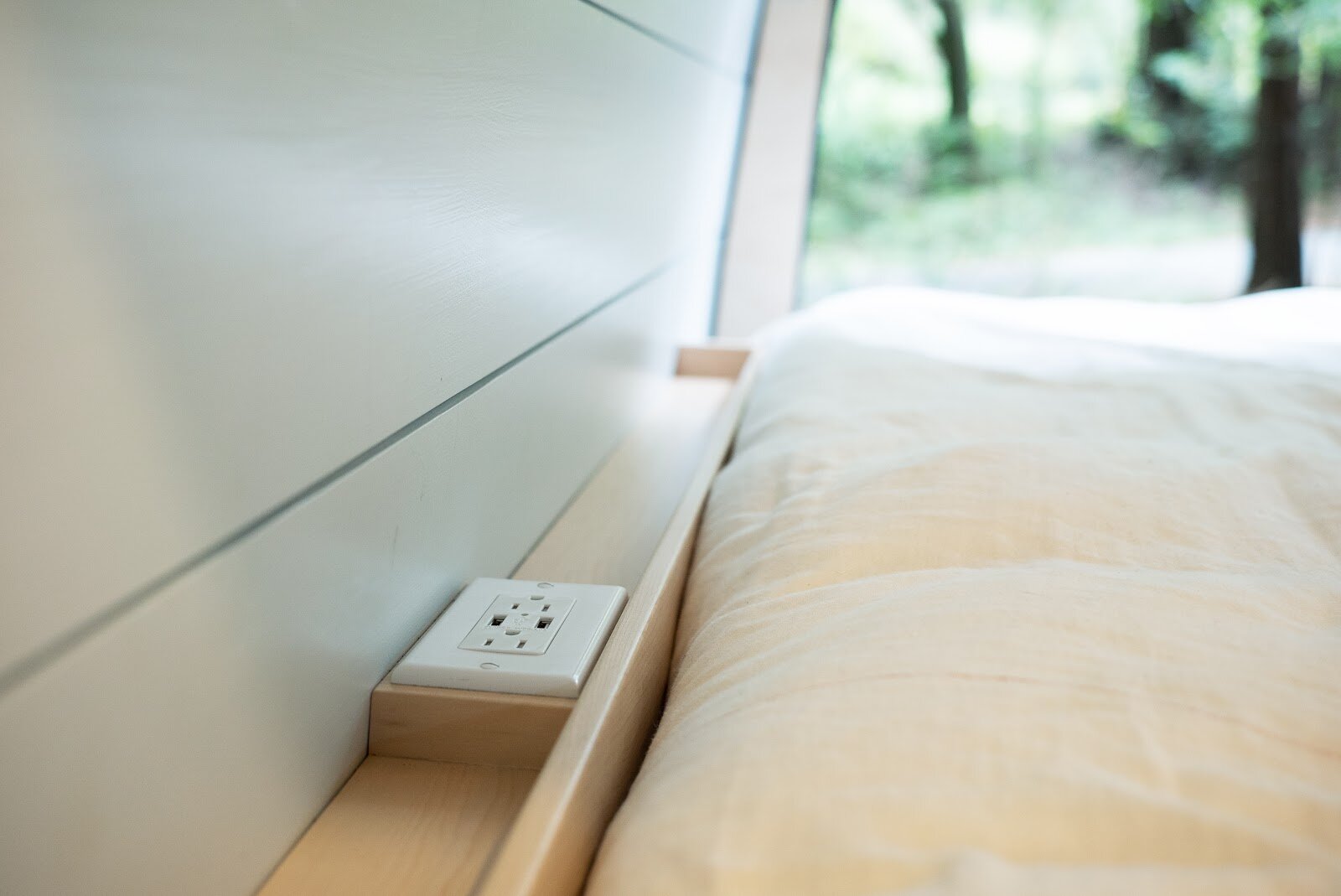How to Work Digital Nomad Jobs From Your Camper Van
More people are working from home now than ever before. Many companies that were forced to switch to a remote work format due to the coronavirus pandemic have seen no drop in efficiency from workers, and have since told employees that they can continue to be remote workers indefinitely. It seems likely that remote work is here to stay.
Factors like the low cost of living, coupled with the popularity of remote work, are encouraging many people to work remote jobs while living in camper vans.
The #vanlife has exploded in popularity recently. So many people are working remotely and traveling that a new term has been coined to describe them: digital nomads. You don’t need to travel to an exotic country in Asia like Bali or Thailand to be a digital nomad; many people are taking their work on the road in their home country by living out of Sprinter vans!
Of course, working a location-independent job from the road comes with a new set of challenges when compared with working from home. With the help of a few tips and gadgets, it is possible to work remotely while traveling in your camper van. Use this guide to learn everything you need to know about working from the road in your Sprinter van!
Photo credit: Muse & Co. Outdoors
Best Jobs for the Digital Nomad Lifestyle
Many people are interested in being a digital nomad, but they don’t know where to start. The digital nomad community is a diverse group of workers from a spectrum of industries.
Many digital nomads work freelance gigs with flexible part-time schedules, such as:
social media specialists
copywriting experts
graphic designers
travel blog writers and other bloggers
SEO specialists
virtual assistants
affiliate marketing specialists
web development specialists
Others work full-time jobs from the road in their sprinter vans. And some people set up ways to earn a passive income, such as renting out a property on AirBnB. Some students even take online courses while living out of their vans!
For beginners who don’t have a remote job yet but want to live the digital nomad lifestyle, online job boards like Upwork, Fiverr, Linkedin, and Indeed are good places to start your remote job search and start to make money online.
How to Access the Internet on the Road from Your Camper Van
Perhaps the greatest challenge when it comes to working from the road is finding the internet access you need. If you’re going to work for a startup or run your own business from the road, you’re going to need a good internet connection.
Campgrounds with WiFi
One of the simplest and most reliable ways to access the internet while traveling is to choose campgrounds and RV parks that offer WiFi. While there are few traditional campgrounds that have WiFi, many RV parks offer a strong WiFi connection, right at your campsite. With a little planning, you can map out a route that puts you in campsites with internet access when you need it.
Public WiFi/Co-Working Spaces
Even during the pandemic, when accessing the internet from a coffee shop may not be an option, you can find a reliable internet connection in many locations. Many public parks and downtown areas offer free access to WiFi, with more public WiFi access being added every day.
Another great option for digital nomads, especially those who work full-time from the road, is to find a co-working space in the area they are staying. Co-working spaces can provide a great home base during busy work weeks and usually have the amenities you need to work comfortably.
Another benefit of co-working spaces is that you are likely to meet like-minded people who run their own online businesses and work from the road.
Cell Phone Tethering
Cell phone tethering is one of the most common ways that digital nomads access the internet while on the road. By using your cell phone as a personal hotspot, you can tether it to your computer and use your phone’s cell signal to access the internet. If you use this method often, you will want to have an unlimited data plan to accommodate the increase in data usage.
So, what do you do if you are relying on cell phone tethering to work remotely, and your signal isn’t as strong as you need it to be? In these scenarios, there’s a gadget that can really save your workday: a cell phone signal booster. Cell phone signal boosters are like a megaphone for your mobile device. They take your cell phone’s signal and amplify it by several times to give you a fast connection where there is normally poor service.
These devices will rarely give you a fast enough signal if you have no service to start with, but in areas with a lower than optimal signal, they work fantastically. The best cell phone signal booster for camper vans is made by weBoost and costs around $500.
Other Gadgets
Cell phone signal boosters are the most popular option for accessing the internet on the road, but they aren’t the only gadgets that can help you get WiFi when you need it. Other options include satellite internet and WiFi range extenders.
Satellite internet receivers can be installed on your van. Theoretically, they give you reliable access to the internet, no matter where you are. Unfortunately, satellite internet has a reputation for being unreliable. WiFi range extenders are a good addition for some types of travelers. They take an existing WiFi signal and amplify it, making it stronger than it otherwise would be in your camper van. These work well in certain situations, such as when you are parked outside of a coffee shop or a friend’s house and you need to amplify the WiFi signal.
Camper Van Must-Haves for Digital Nomad Life
Reliable internet access is essential for being able to work on the road. Additionally, you’ll want to be sure that your camper van is outfitted with some basic features to make working remotely possible. Below, we’ve outlined some of the must-have camper van features for working remotely:
A Workspace
It may seem obvious, but if you are going to work from your camper van, make sure it has a comfortable and functional workspace. Like most features in your camper van, your work area can have multiple uses. Many vanlifers opt to work at their table, which doubles as both a desk and a dining area.
Not all van designs include a dining area, so be sure that you choose a Sprinter van with a comfortable place to work. Swiveling captain’s chairs are a great addition that can open up your living space and allow you to work comfortably for long periods of time.
Photo credit: Muse & Co. Outdoors
Charging Capabilities
In order to be able to work from the road, you’ve got to be able to charge your devices. Most camper vans come equipped with a 12V DC electrical system, but your laptop is built to plug into a standard household 120V AC outlet. In order to charge your laptop in your camper van, you’ll need a pure sine wave inverter and convenient outlets in your living area. The inverter converts the 12V DC power to 120V AC, so you can use normal household outlets to charge your laptop and other devices.
Of course, your van will also need a way to charge its batteries so that you can work reliably while traveling. It’s good to be able to plug in when you have shore power accessible, such as outside your home or at an RV park. But your van should also have off-grid charging capabilities for times when shore power is not available. For this, harnessing the energy of the sun by placing solar panels on the roof of your van is a great option.
If you find yourself working from home and dreaming about all the places you could be, turn those dreams into reality! A Sprinter camper van with the right features and equipment can allow you to be in the places you love while continuing to work remotely. Whether you are looking to travel for a weekend or weeks on end, an interior build from Muse & Co. Outdoors will allow you to play, work, and travel to the places you love in style.


